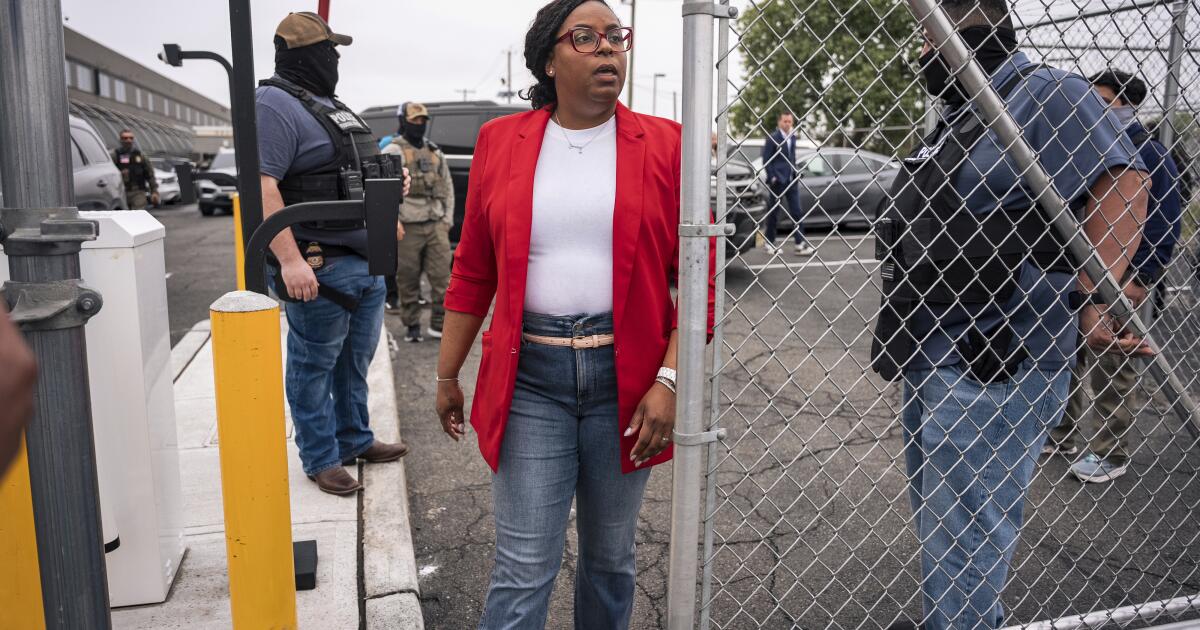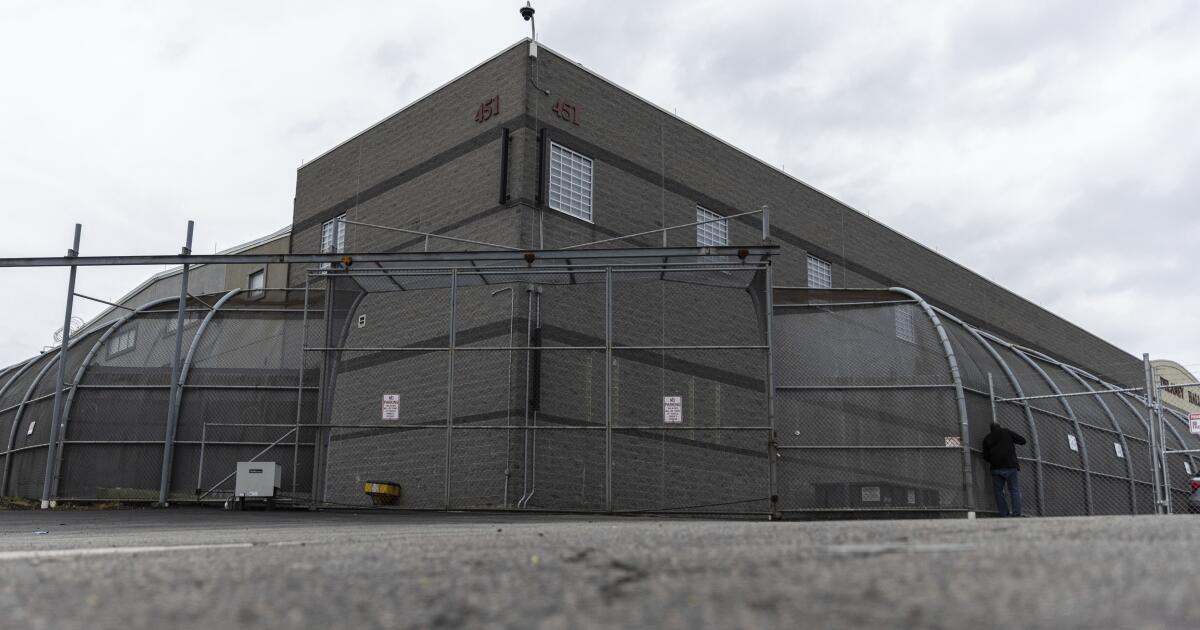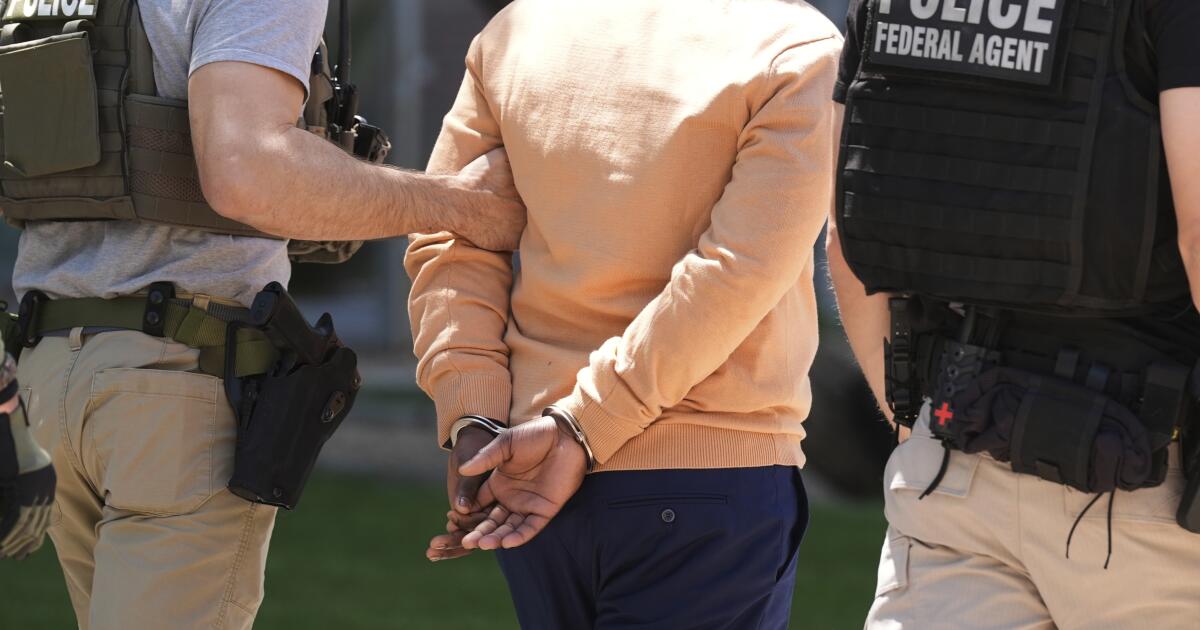Contributor: Immigration enforcement needs oversight. ICE can’t just ban lawmakers
As the Trump administration continues to ramp up immigration enforcement actions, a group of lawmakers is suing Immigration and Customs Enforcement for placing restrictions on detention center visits — obstructing Congress’ role in overseeing government functions.
Twelve House Democrats filed a lawsuit challenging new guidelines that require advance notice for oversight visits and render certain facilities off-limits. “No child should be sleeping on concrete, and no sick person should be denied care,” said Rep. Jimmy Gomez (D-Los Angeles). “Yet that’s exactly what we keep hearing is happening inside Trump’s detention centers.”
These lawmakers are right to seek access to detention facilities. Detention centers have long been plagued by poor conditions, so the need for oversight is urgent. With record numbers of migrants being detained, the public has a right to know how people in the government’s custody are being treated.
The U.S. operates the world’s largest immigration detention system, at a cost of $3 billion a year. This money is appropriated by Congress — and comes with conditions.
Under existing law, none of the funds given to Homeland Security may be used to prevent members of Congress from conducting oversight visits of “any facility operated by or for the Department of Homeland Security used to detain or otherwise house aliens.” In addition, the law states that members of Congress are not required to “provide prior notice of the intent to enter a facility.” So ICE’s attempt to place limits on oversight appears to be illegal.
The restrictions are also problematic because they claim to exempt the agency’s field offices from oversight. However, migrants are being locked up in such offices, including at the Edward R. Roybal Federal Building in Los Angeles, and 26 Federal Plaza in New York City. In the former, one detainee reported being fed only once a day, at 3 a.m. In the latter, as many as 80 detainees have been crammed into a single room amid sweltering summer temperatures. These offices were never set up to house people overnight or for days or weeks. If they are functioning as de facto detention centers, then they must be subject to inspections.
Congressional oversight of immigration detention is vital right now. The current capacity for U.S. detention facilities is 41,000. Yet the government was holding nearly 57,000 people as of July 27. That means facilities are far over capacity, in a system that the Vera Institute of Justice describes as “plagued by abuse and neglect.”
No matter who is president, conditions in immigrant detention are generally abysmal. Migrant detention centers have been cited for their lack of medical care, poor treatment of detainees, and physical and sexual violence. In 2019, the federal government itself reported that conditions in detention were inhumane. At least 11 people have died in detention since January. This reality cries out for more transparency and accountability — especially because Homeland Security laid off most of its internal watchdogs earlier this year.
The ranks of detainees include asylum-seekers, teenagers, DACA recipients, pregnant women, journalists and even U.S. citizens. Most of the detainees arrested lately have no criminal convictions. These folks are often arrested and moved thousands of miles away from home, complicating their access to legal representation and family visits. A visit by a congressional delegation may be the only way to ensure that they are being treated properly.
In response to the lawsuit by House Democrats, Tricia McLaughlin, a spokesperson for Homeland Security, said: “These members of Congress could have just scheduled a tour. Instead, they’re running to court to drive clicks and fundraising emails.” She added that ICE was imposing the new limits, in part, because of “obstructions to enforcement, including by politicians themselves.”
McLaughlin might have been referring to a May scuffle outside a Newark, N.J., detention center that led to charges being filed against Rep. LaMonica McIver (D-N.J.) and the arrest of the city’s mayor. But this incident would not have occurred if immigration officials had followed the law and allowed lawmakers inside to survey the facility’s conditions.
Indeed, the acting director of ICE, Todd Lyons, told a congressional hearing in May that he recognized the right of members to visit detention facilities, even with no notice. And the notion that any government agency can unilaterally regulate Congress runs afoul of the Constitution. The legislative branch has the right and obligation to supervise the executive branch. Simply put, ICE cannot tell members of Congress what they can or cannot do.
The need for oversight in detention facilities will only become greater in the future, as Congress just approved $45 billion for the expansion of immigrant detention centers. This could result in the daily detention of at least 116,000 people. Meanwhile, 55% of Americans, according to the Pew Center, disapprove of building more facilities to hold immigrants.
ICE’s new policies violate federal law. No agency is above oversight — and members of Congress must be allowed full access to detention facilities.
Raul A. Reyes is an immigration attorney and contributor to NBC Latino and CNN Opinion. X: @RaulAReyes; Instagram: @raulareyes1


